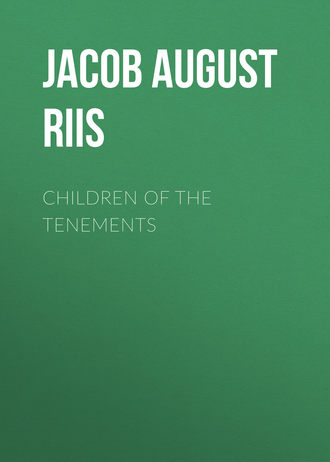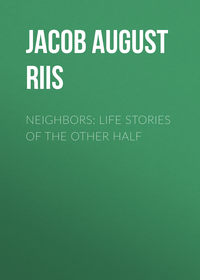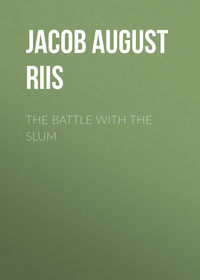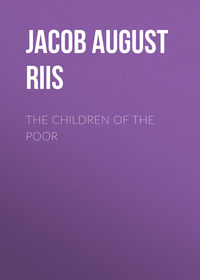 полная версия
полная версияChildren of the Tenements
In a minute the whole building was astir from cellar to roof. A dozen heads were thrust out of every window, and answering wails carried messages of helpless sympathy to the once so unpopular Rose. Upon this concert of sorrow the police broke in with anxious inquiry as to what was the matter.
When they found out, a second relief expedition was organized. It reached Rose through the basement coal-bin, and she was carried out and sent to the Gouverneur Hospital. There she lies, unable to move, and the tenement wonders what is amiss that it has lost its old spirits. It has not even anything left to swear at.
The cat took the kosher meat.
NIBSY'S CHRISTMAS
It was Christmas Eve over on the East Side. Darkness was closing in on a cold, hard day. The light that struggled through the frozen windows of the delicatessen store and the saloon on the corner, fell upon men with empty dinner-pails who were hurrying homeward, their coats buttoned tightly, and heads bent against the steady blast from the river, as if they were butting their way down the street.
The wind had forced the door of the saloon ajar, and was whistling through the crack; but in there it seemed to make no one afraid. Between roars of laughter, the clink of glasses and the rattle of dice on the hardwood counter were heard out in the street. More than one of the passers-by who came within range was taken with an extra shiver in which the vision of wife and little ones waiting at home for his coming was snuffed out, as he dropped in to brace up. The lights were long out when the silent streets reëchoed his unsteady steps toward home, where the Christmas welcome had turned to dread.
But in this twilight hour they burned brightly yet, trying hard to pierce the bitter cold outside with a ray of warmth and cheer. Where the lamps in the delicatessen store made a mottled streak of brightness across the flags, two little boys stood with their noses flattened against the window. The warmth inside, and the lights, had made little islands of clear space on the frosty pane, affording glimpses of the wealth within, of the piles of smoked herring, of golden cheese, of sliced bacon and generous, fat-bellied hams; of the rows of odd-shaped bottles and jars on the shelves that held there was no telling what good things, only it was certain that they must be good from the looks of them.
And the heavenly smell of spices and things that reached the boys through the open door each time the tinkling bell announced the coming or going of a customer! Better than all, back there on the top shelf the stacks of square honey-cakes, with their frosty coats of sugar, tied in bundles with strips of blue paper.
The wind blew straight through the patched and threadbare jackets of the lads as they crept closer to the window, struggling hard by breathing on the pane to make their peep-holes bigger, to take in the whole of the big cake with the almonds set in; but they did not heed it.
"Jim!" piped the smaller of the two, after a longer stare than usual; "hey, Jim! them's Sante Claus's. See 'em?"
"Sante Claus!" snorted the other, scornfully, applying his eye to the clear spot on the pane. "There ain't no ole duffer like dat. Them's honey-cakes. Me 'n' Tom had a bite o' one wunst."
"There ain't no Sante Claus?" retorted the smaller shaver, hotly, at his peep-hole. "There is, too. I seen him myself when he cum to our alley last—"
"What's youse kids a-scrappin' fur?" broke in a strange voice.
Another boy, bigger, but dirtier and tougher looking than either of the two, had come up behind them unobserved. He carried an armful of unsold "extras" under one arm. The other was buried to the elbow in the pocket of his ragged trousers.
The "kids" knew him, evidently, and the smallest eagerly accepted him as umpire.
"It's Jim w'at says there ain't no Sante Claus, and I seen him—"
"Jim!" demanded the elder ragamuffin, sternly, looking hard at the culprit; "Jim! yere a chump! No Sante Claus? What're ye givin' us? Now, watch me!"
With utter amazement the boys saw him disappear through the door under the tinkling bell into the charmed precincts of smoked herring, jam, and honey-cakes. Petrified at their peep-holes, they watched him, in the veritable presence of Santa Claus himself with the fir-branch, fish out five battered pennies from the depths of his pocket and pass them over to the woman behind the jars, in exchange for one of the bundles of honey-cakes tied with blue. As if in a dream they saw him issue forth with the coveted prize.
"There, kid!" he said, holding out the two fattest and whitest cakes to Santa Claus's champion; "there's yer Christmas. Run along, now, to yer barracks; and you, Jim, here's one for you, though yer don't desarve it. Mind ye let the kid alone."
"This one'll have to do for me grub, I guess. I ain't sold me 'Newses,' and the ole man'll kick if I bring 'em home."
Before the shuffling feet of the ragamuffins hurrying homeward had turned the corner, the last mouthful of the newsboy's supper was smothered in a yell of "Extree!" as he shot across the street to intercept a passing stranger.
As the evening wore on, it grew rawer and more blustering still. Flakes of dry snow that stayed where they fell, slowly tracing the curb-lines, the shutters, and the door-steps of the tenements with gathering white, were borne up on the storm from the water. To the right and left stretched endless streets between the towering barracks, as beneath frowning cliffs pierced with a thousand glowing eyes that revealed the watch-fires within—a mighty city of cave-dwellers held in the thraldom of poverty and want.
Outside there was yet hurrying to and fro. Saloon doors were slamming, and bare-legged urchins, carrying beer-jugs, hugged the walls close for shelter. From the depths of a blind alley floated out the discordant strains of a vagabond brass band "blowing in" the yule of the poor. Banished by police ordinance from the street, it reaped a scant harvest of pennies for Christmas cheer from the windows opening on the back yard. Against more than one pane showed the bald outline of a forlorn little Christmas tree, some stray branch of a hemlock picked up at the grocer's and set in a pail for "the childer" to dance around, a dime's worth of candy and tinsel on the boughs.
From the attic over the way came, in spells between, the gentle tones of a German song about the Christ-child. Christmas in the East Side tenements begins with the sunset on the "Holy Eve," except where the name is as a threat or a taunt. In a hundred such homes the whir of many sewing-machines, worked by the sweater's slaves with weary feet and aching backs, drowned every feeble note of joy that struggled to make itself heard above the noise of the great treadmill.
To these what was Christmas but the name for suffering, reminder of lost kindred and liberty, of the slavery of eighteen hundred years, freedom from which was purchased only with gold. Ay, gold! The gold that had power to buy freedom yet, to buy the good-will, ay, and the good name, of the oppressor, with his houses and land. At the thought the tired eye glistened, the aching back straightened, and to the weary foot there came new strength to finish the long task while the city slept.
Where a narrow passageway put in between two big tenements to a ramshackle rear barrack, Nibsy, the newsboy, halted in the shadow of the doorway and stole a long look down the dark alley.
He toyed uncertainly with his still unsold papers—worn dirty and ragged as his clothes by this time—before he ventured in, picking his way between barrels and heaps of garbage; past the Italian cobbler's hovel, where a tallow dip, stuck in a cracked beer-glass, before a picture of the "Mother of God," showed that even he knew it was Christmas and liked to show it; past the Sullivan flat, where blows and drunken curses mingled with the shriek of women, as Nibsy had heard many nights before this one.
He shuddered as he felt his way past the door, partly with a premonition of what was in store for himself, if the "old man" was at home, partly with a vague, uncomfortable feeling that somehow Christmas Eve should be different from other nights, even in the alley; down to its farthest end, to the last rickety flight of steps that led into the filth and darkness of the tenement. Up this he crept, three flights, to a door at which he stopped and listened, hesitating, as he had stopped at the entrance to the alley; then, with a sudden, defiant gesture, he pushed it open and went in.
A bare and cheerless room; a pile of rags for a bed in the corner, another in the dark alcove, miscalled bedroom; under the window a broken candle and an iron-bound chest, upon which sat a sad-eyed woman with hard lines in her face, peeling potatoes in a pan; in the middle of the room a rusty stove, with a pile of wood, chopped on the floor alongside. A man on his knees in front fanning the fire with an old slouch hat. With each breath of draught he stirred, the crazy old pipe belched forth torrents of smoke at every joint. As Nibsy entered, the man desisted from his efforts and sat up, glaring at him—a villanous ruffian's face, scowling with anger.
"Late ag'in!" he growled; "an' yer papers not sold. What did I tell yer, brat, if ye dared—"
"Tom! Tom!" broke in the wife, in a desperate attempt to soothe the ruffian's temper. "The boy can't help it, an' it's Christmas Eve. For the love o'—"
"The devil take yer rot and yer brat!" shouted the man, mad with the fury of passion. "Let me at him!" and, reaching over, he seized a heavy knot of wood and flung it at the head of the boy.
Nibsy had remained just inside the door, edging slowly toward his mother, but with a watchful eye on the man at the stove. At the first movement of his hand toward the woodpile he sprang for the stairway with the agility of a cat, and just dodged the missile. It struck the door, as he slammed it behind him, with force enough to smash the panel.
Down the three flights in as many jumps he went, and through the alley, over barrels and barriers, never stopping once till he reached the street, and curses and shouts were left behind.
In his flight he had lost his unsold papers, and he felt ruefully in his pocket as he went down the street, pulling his rags about him as much from shame as to keep out the cold.
Four pennies were all he had left after his Christmas treat to the two little lads from the barracks; not enough for supper or for a bed; and it was getting colder all the time.
On the sidewalk in front of the notion store a belated Christmas party was in progress. The children from the tenements in the alley and across the way were having a game of blind-man's-buff, groping blindly about in the crowd to catch each other. They hailed Nibsy with shouts of laughter, calling to him to join in.
"We're having Christmas!" they yelled.
Nibsy did not hear them. He was thinking, thinking, the while turning over his four pennies at the bottom of his pocket. Thinking if Christmas was ever to come to him, and the children's Santa Claus to find his alley where the baby slept within reach of her father's cruel hand. As for him, he had never known anything but blows and curses. He could take care of himself. But his mother and the baby—And then it came to him with shuddering cold that it was getting late, and that he must find a place to sleep.
He weighed in his mind the merits of two or three places where he was in the habit of hiding from the "cops" when the alley got to be too hot for him.
There was the hay barge down by the dock, with the watchman who got drunk sometimes, and so gave the boys a chance. The chances were at least even of its being available on Christmas Eve, and of Santa Claus having thus done him a good turn after all.
Then there was the snug berth in the sand-box you could curl all up in. Nibsy thought with regret of its being, like the hay barge, so far away and to windward, too.
Down by the printing-offices there were the steam gratings, and a chance corner in the cellars, stories and stories underground, where the big presses keep up such a clatter from midnight till far into the day.
As he passed them in review, Nibsy made up his mind with sudden determination, and, setting his face toward the south, made off down town.
*****The rumble of the last departing news-wagon over the pavement, now buried deep in snow, had died away in the distance, when, from out of the bowels of the earth there issued a cry, a cry of mortal terror and pain that was echoed by a hundred throats.
From one of the deep cellar-ways a man ran out, his clothes and hair and beard afire; on his heels a breathless throng of men and boys; following them, close behind, a rush of smoke and fire.
The clatter of the presses ceased suddenly, to be followed quickly by the clangor of hurrying fire-bells. With hooks and axes the firemen rushed in; hose was let down through the manholes, and down there in the depths the battle was fought and won.
The building was saved; but in the midst of the rejoicing over the victory there fell a sudden silence. From the cellar-way a grimy, helmeted figure arose, with something black and scorched in his arms. A tarpaulin was spread upon the snow and upon it he laid his burden, while the silent crowd made room and word went over to the hospital for the doctor to come quickly.
Very gently they lifted poor little Nibsy—for it was he, caught in his berth by a worse enemy than the "cop" or the watchman of the hay barge—into the ambulance that bore him off to the hospital cot, too late.
Conscious only of a vague discomfort that had succeeded terror and pain, Nibsy wondered uneasily why they were all so kind. Nobody had taken the trouble to as much as notice him before. When he had thrust his papers into their very faces they had pushed him roughly aside.
Nibsy, unhurt and able to fight his way, never had a show. Sick and maimed and sore, he was being made much of, though he had been caught where the boys were forbidden to go. Things were queer, anyhow, and—
The room was getting so dark that he could hardly see the doctor's kindly face, and had to grip his hand tightly to make sure that he was there; almost as dark as the stairs in the alley he had come down in such a hurry.
There was the baby now—poor baby—and mother—and then a great blank, and it was all a mystery to poor Nibsy no longer. For, just as a wild-eyed woman pushed her way through the crowd of nurses and doctors to his bedside, crying for her boy, Nibsy gave up his soul to God.
*****It was very quiet in the alley. Christmas had come and gone. Upon the last door a bow of soiled crape was nailed up with two tacks. It had done duty there a dozen times before, that year.
Upstairs, Nibsy was at home, and for once the neighbors, one and all, old and young, came to see him.
Even the father, ruffian that he was, offered no objection. Cowed and silent, he sat in the corner by the window farthest from where the plain little coffin stood, with the lid closed down.
A couple of the neighbor-women were talking in low tones by the stove, when there came a timid knock at the door. Nobody answering, it was pushed open, first a little, then far enough to admit the shrinking form of a little ragamuffin, the smaller of the two who had stood breathing peep-holes on the window pane of the delicatessen store the night before when Nibsy came along.
He dragged with him a hemlock branch, the leavings from some Christmas tree at the grocery.
"It's from Sante Claus," he said, laying it on the coffin. "Nibsy knows." And he went out.
Santa Claus had come to Nibsy, after all, in his alley. And Nibsy knew.
IN THE CHILDREN'S HOSPITAL
The fact was printed the other day that the half-hundred children or more who are in the hospitals on North Brother Island had no playthings, not even a rattle, to make the long days skip by, which, set in smallpox, scarlet fever, and measles, must be longer there than anywhere else in the world. The toys that were brought over there with a consignment of nursery tots who had the typhus fever had been worn clean out, except some fish horns which the doctor frowned on, and which were therefore not allowed at large. Not as much as a red monkey on a yellow stick was there left on the island to make the youngsters happy.
That afternoon a big, hearty-looking man came into the office with the paper in his hand, and demanded to see the editor. He had come, he said, to see to it that those sick youngsters got the playthings they were entitled to; and a regular Santa Claus he proved to the friendless little colony on the lonely island; for he left a crisp fifty-dollar note behind when he went away without giving his name. The single condition was attached to the gift that it should be spent buying toys for the children on North Brother Island.
Accordingly, a strange invading army took the island by storm three or four nights ago. Under cover of the darkness it had itself ferried over from One Hundred and Thirty-eighth Street in the department yawl, and before morning it was in undisputed possession. It has come to stay. Not a doll or a sheep will ever leave the island again. They may riot upon it as they please, within certain well-defined limits, but none of them can ever cross the channel to the mainland again, unless it be the rubber dolls who can swim, so it is said. Here is the muster-roll:—
Six sheep (four with lambs), six fairies (big dolls in street dress), twelve rubber dolls (in woollen jackets), four railroad trains, twenty-eight base-balls, twenty rubber balls, six big painted (Scotch plaid) rubber balls, six still bigger ditto, seven boxes of blocks, half a dozen music-boxes, twenty-four rattles, six bubble (soap) toys, twelve small engines, six games of dominos, twelve rubber toys (old woman who lived in a shoe, etc.), five wooden toys (bad bear, etc.), thirty-six horse reins.
As there is only one horse on the island, and that one a very steady-going steed in no urgent need of restraint, this last item might seem superfluous, but only to the uninstructed mind. Within a brief week half the boys and girls on the island that are out of bed long enough to stand on their feet will be transformed into ponies and the other half into drivers, and flying teams will go cavorting around to the tune of "Johnny, Get your Gun," and the "Jolly Brothers Gallop," as they are ground out of the music-boxes by little fingers that but just now toyed feebly with the balusters on the golden stair.
That music! When I went over to the island it fell upon my ears in little drops of sweet melody, as soon as I came in sight of the nurses' quarters. I listened, but couldn't make out the tune. The drops seemed mixed. When I opened the door upon one of the nurses, Dr. Dixon, and the hospital matron, each grinding his or her music for all there was in it, and looking perfectly happy withal, I understood why.
They were all playing different tunes at the same time, the nurse "When the Robins Nest Again," Dr. Dixon "Nancy Lee," and the matron "Sweet Violets." A little child stood by in open-mouthed admiration, that became ecstasy when I joined in with "The Babies on our Block." It was all for the little one's benefit, and she thought it beautiful without a doubt.
The storekeeper, knowing that music hath charms to soothe the breast of even a typhus-fever patient, had thrown in a dozen boxes as his own gift. Thus one good deed brings on another, and a good deal more than fifty dollars' worth of happiness will be ground out on the island before there is an end of the music.
There is one little girl in the measles ward already who will eat only when her nurse sits by grinding out "Nancy Lee." She cannot be made to swallow one mouthful on any other condition. No other nurse and no other tune but "Nancy Lee" will do—neither the "Star-Spangled Banner" nor "The Babies on our Block." Whether it is Nancy all by her melodious self, or the beautiful picture of her in a sailor's suit on the lid of the box, or the two and the nurse and the dinner together, that serve to soothe her, is a question of some concern to the island, since Nancy and the nurse have shown signs of giving out together.
Three of the six sheep that were bought for the ridiculously low price of eighty-nine cents apiece, the lambs being thrown in as makeweight, were grazing on the mixed-measles lawn over on the east shore of the island, with a fairy in evening dress eying them rather disdainfully in the grasp of tearful Annie Cullum. Annie is a foundling from the asylum temporarily sojourning here. The measles and the scarlet fever were the only things that ever took kindly to her in her little life. They tackled her both at once, and poor Annie, after a six or eight weeks' tussle with them, has just about enough spunk left to cry when anybody looks at her.
Three woolly sheep and a fairy all at once have robbed her of all hope, and in the midst of it all she weeps as if her heart would break. Even when the nurse pulls one of the unresisting muttonheads, and it emits a loud "Baa-a," she stops only just for a second or two and then wails again. The sheep look rather surprised, as they have a right to. They have come to be little Annie's steady company, hers and her fellow-sufferers' in the mixed-measles ward. The triangular lawn upon which they are browsing is theirs to gambol on when the sun shines, but cross the walk that borders it they never can, any more than the babies with whom they play. Sumptuary law rules the island they are on. Habeas corpus and the constitution stop short of the ferry. Even Comstock's authority does not cross it: the one exception to the rule that dolls and sheep and babies shall not visit from ward to ward is in favor of the rubber dolls, and the etiquette of the island requires that they shall lay off their woollen jackets and go calling just as the factory turned them out, without a stitch or shred of any kind on.
As for the rest, they are assigned, babies, nurses, sheep, rattles, and railroad trains, to their separate measles, scarlet fever, and diphtheria lawns or wards, and there must be content to stay. A sheep may be transferred from the scarlet-fever ward with its patron to the mixed-measles or diphtheria, when symptoms of either of these diseases appear, as they often do; but it cannot then go back again, lest it carry the seeds of the new contagion to its old friends.
Even the fairies are put under the ban of suspicion by such evil associations, and, once they have crossed the line, are not allowed to go back to corrupt the good manners of the babies with only one complaint.
Pauline Meyer, the bigger of the two girls on the mixed-measles stoop,—the other is friendless Annie,—has just enough strength to laugh when her sheep's head is pulled. She has been on the limits of one ward after another these four months, and has had everything, short of typhus fever and smallpox, that the island affords.
It is a marvel that there is one laugh left in her whole little shrunken body after it all; but there is, and the grin on her face reaches almost from ear to ear, as she clasps the biggest fairy in an arm very little stouter than a boy's bean blower, and hears the lamb bleat. Why, that one smile on that ghastly face would be thought worth his fifty dollars by the children's friend, could he see it. Pauline is the child of Swedish emigrants. She and Annie will not fight over their lambs and their dolls, not for many weeks. They can't. They can't even stand up.
One of the railroad trains, drawn by a glorious tin engine, with the name "Union" painted on the cab, is making across the stoop for the little boy with the whooping-cough in the next building. But it won't get there; it is quarantined. But it will have plenty of exercise. Little hands are itching to get hold of it in one of the cribs inside. There are thirty-six sick children on the island just now, about half of them boys, who will find plenty of use for the balls and things as soon as they get about. How those base-balls are to be kept within bounds is a hopeless mystery the doctors are puzzling over.
Even if nines are organized in every ward, as has been suggested, it is hard to see how they can be allowed to play each other, as they would want to, of course, as soon as they could toddle about. It would be something, though, a smallpox nine pitted against the scarlets or the measles, with an umpire from the mixed ward!









